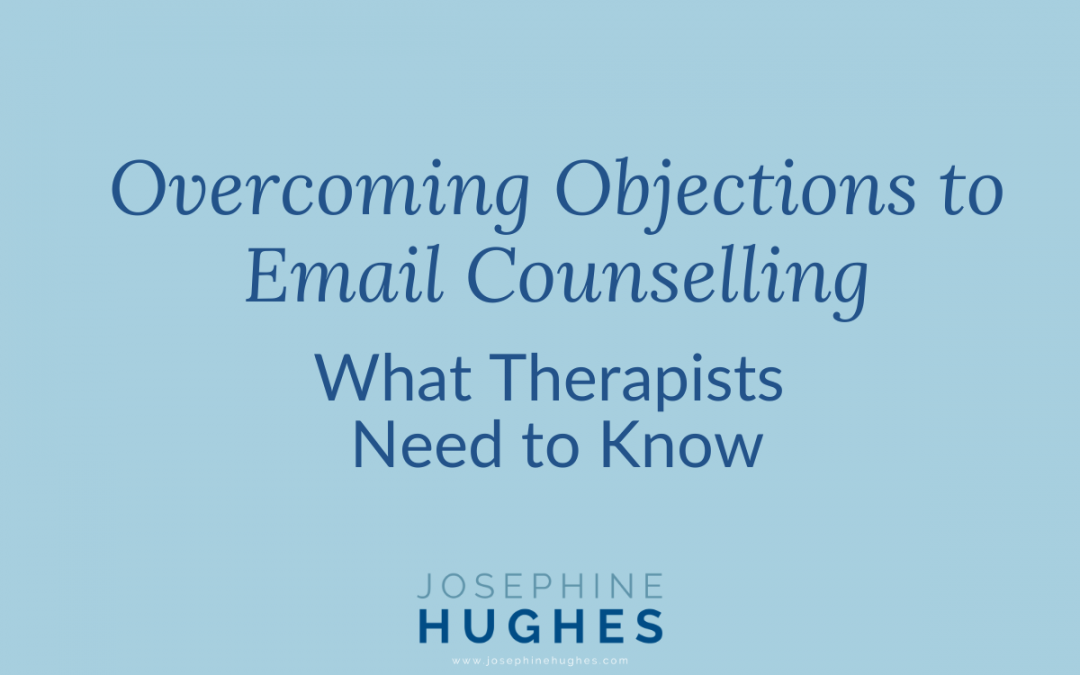Do you feel sceptical about the idea of email counselling? Many therapists wonder whether something that happens entirely in writing – with no tone of voice, facial expression, or real-time conversation – can really be as effective as face to face therapy.
In this week’s episode of Good Enough Counsellors, I spoke with Chloe Foster, humanistic counsellor and founder of Email Counselling Academy, who’s on a mission to help more therapists understand the depth and power of this way of working.
And honestly? After hearing how she works, it’s hard to see email counselling as anything less than other types of therapy. But if you’ve got questions, I will briefly cover the answers below.
You can listen to the full discussion here:
If you would like to subscribe to the podcast, click here.
What Email Counselling Actually Looks Like
Forget the idea of hasty, dashed-off messages between sessions.
Email counselling is a structured, therapeutic exchange – one carefully crafted email from the client each week, followed by a considered reply from the counsellor, usually two days later.
It’s not instant. It’s not casual.
It’s a thoughtful process with clear boundaries, word limits (often around 500 words), and reflection time built in.
That space between sending and receiving allows both client and counsellor to slow down – and that can be therapeutic in itself.
Can Therapy Really Go as Deep Without Seeing the Client?
It’s a common concern, and Chloe hears this all the time.
But as she points out, we already work deeply with clients we don’t see – for example, on the phone.
In email counselling, counsellors use their written reflections to pick up themes, emotions, and repeated patterns across messages.
And clients often find that writing gives them a chance to express things they couldn’t say out loud.
Chloe told me, “Clients can really get to the nuts and bolts of what they want to say – without the waffle that sometimes happens in a 50-minute session.”
Do Clients Actually Want Email Counselling?
Many therapists assume they don’t.
But Chloe’s experience says otherwise. During lockdown, her email counselling practice flourished – and demand has stayed high ever since.
It’s particularly popular with:
- Parents and carers who struggle to find quiet space for therapy
- Shift workers and night owls who prefer flexibility
- Neurodivergent clients who value processing time and structure
- People who find speaking in person too overwhelming
- Clients exploring sensitive issues like sexuality, grief, or trauma
When clients discover that therapy can happen in writing, many are relieved to find an approach that fits their lives.
Is It Something You Can Just Add to Your Practice?
Email counselling isn’t just sending notes back and forth. It’s a specialist skill that requires secure systems, clear contracting, and knowledge of how to assess risk when communication is delayed.
Without proper training, counsellors can easily find themselves outside ethical or insurance cover.
That’s why Chloe founded the Email Counselling Academy and created a six-month Professional Certificate in Email Counselling to help therapists feel confident, competent, and covered.
Why Email Counselling Deserves Recognition
For Chloe, email counselling isn’t a lesser form of therapy – it’s simply different.
It gives clients time to think, write, and revisit their own words.
It’s also expanding access to counselling for people who might never walk through a therapy room door.
As she says, “If we don’t tell clients this option exists, how will they ever know it’s there?”
If You’re Curious to Learn More
You can listen to my full conversation with Chloe Foster on the Good Enough Counsellors podcast:
Is Email Counselling Real Therapy? With Chloe Foster – click HERE
To find out more about Chloe’s training, visit Email Counselling Academy.
Next Steps for Therapists
As Chloe says, unless you tell people about your service, how will they know it’s there? In Therapy Growth Group I help you make your marketing more effective and show you ways you can reach more clients – all so that you can grow a sustainable counselling private practice.
Come and join us for practical support and accountability – one small, doable action at a time.
Find out more HERE.

